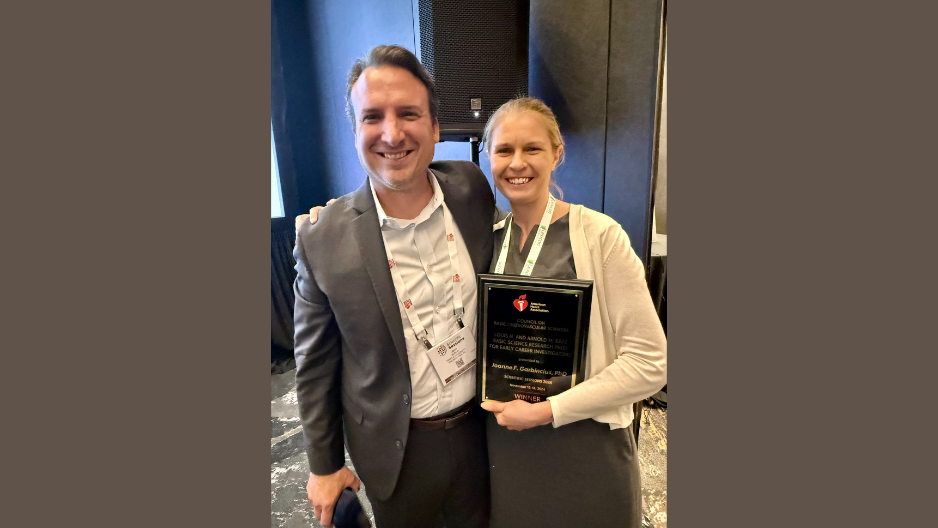Dr. Joanne Garbincius, PhD, Instructor in the Elrod Laboratory in the Aging + Cardiovascular Discovery Center (ACDC) at the Lewis Katz School of Medicine, won the American Heart Association’s (AHA) 2024 Louis N. and Arnold M. Katz Basic Science Research Prize for Early Career Investigators at the AHA’s Scientific Sessions in November. The prize recognizes fundamental biochemical, cellular, and molecular studies that provide new insight into the mechanisms underlying cardiovascular biology and disease. It is one of the most prestigious honors that the AHA confers on early career scientists. Dr. Garbincius won for her discovery of the protein TMEM65’s critical role in mitochondrial calcium exchange, a process important for cellular energy balance and cell death in diseases including heart failure and neurodegeneration.
Dr. Garbincius recognizes this achievement as a significant early milestone in her career. Expressing her gratitude, Dr. Garbincius stated, "It’s a great honor to receive the Katz Award. Several of my senior colleagues in the cardiovascular field whom I’ve always looked up to won this prize in past years. It means a lot to me to be counted among them."
Dr. Garbincius’s interest in mitochondrial biology stems from her years in college and graduate school, where she investigated inherited heart and skeletal muscle diseases. During her doctoral research, Dr. Garbincius aimed to understand how the regulation of blood flow to the heart becomes disrupted in Duchenne muscular dystrophy. When it functions normally, this process ensures an adequate supply of oxygen to the heart muscle, so its mitochondria can provide the energy that the heart needs to pump. She remarked, "That research project got me interested in learning more about mitochondrial energy metabolism and its impact on heart and skeletal muscle disease. It is what motivated me to study mitochondria for my postdoctoral training."
Asked what advice she would give to other early-career researchers aspiring to achieve similar recognition in their fields, Dr. Garbincius responded, “Hard work and persistence pay off. There is no substitute. My advice to trainees and other young investigators is to find the field or research topic where you most enjoy putting in the work needed to move your project forward." Emphasizing the collective time and effort that goes into a research study of its caliber,. Dr. Garbincius notes that her project on TMEM65 benefitted from the collaborative environment in the ACDC and included contributions from five Temple University undergraduates she has mentored in the laboratory. She also credits the impact that her postdoctoral mentor, Dr. John Elrod, has had on the project and her career progression. “John never stops encouraging me to think bigger with my science and to push for my best. He has always given me the support and feedback I need to make it happen.”
Dr. Elrod is the W.W. Smith Chair in Cardiovascular Medicine and the Director of the Aging + Cardiovascular Discovery Center at the Lewis Katz School of Medicine. He supervised the research that earned Dr. Garbincius the Katz Award, and acknowledges the magnitude of this honor and the impact that Dr. Garbincius’s investigations will have on the fight to improve human health. “Joanne’s commitment to excellence and drive for scientific discovery are truly inspiring. This prize is well-deserved and a recognition of her contributions to the scientific enterprise that forms the foundation for our understanding of human disease. Joanne’s relentless pursuit of the science —the how and why— serves as a template for success for our younger trainees. Her research will enable us to devise new strategies to combat a wide range of conditions – not just heart and skeletal muscle disease, but illnesses like Alzheimer’s disease and cancer as well."

